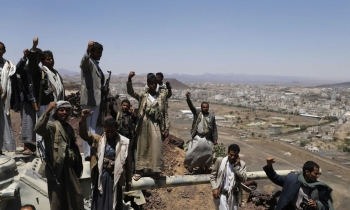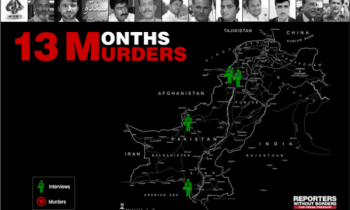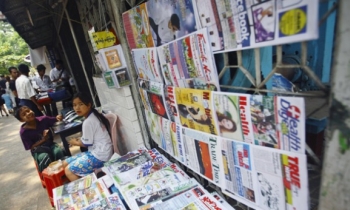Reuters has urged the US military to investigate the killing of one of its journalists by American troops in Baghdad a year ago. An independent inquiry commissioned by Reuters concluded that the soldiers' shooting of television soundman Waleed Khaled on August 28 last year had appeared "unlawful".

The Pentagon, a Reuters wire story said, had failed to respond to requests to review the local commander's ruling, which said the firing of shots at the car was "appropriate". In April, Reuters gave the US Defense Department the report, which found the soldiers' own evidence did not support the commander's conclusion.
The report also criticised the military for "losing" vital video footage of the incident shot by the Reuters cameraman who was Khaled's passenger. He was wounded and then arrested by troops.
"The Defense Department has ignored the independent report which concluded that US soldiers breached their rules of engagement and the shooting of Waleed was prima facie unlawful," said Michael Lawrence, Reuters Managing Editor for Europe, Middle East and Africa. "Reuters calls on the US government to conduct a full and objective investigation into the death of Waleed Khaled."
The report by a former British military investigator working for The Risk Advisory Group (TRAG) said soldiers had fired from a rooftop at Khaled, 33, and cameraman Haider Kadhem, 23, as they sat in a stationary car while Kadhem filmed the aftermath of an attack on a police patrol through the windscreen. The two were out to investigate a report of clashes between armed men and police in Baghdad's Hay al-Adil district.
Kadhem, the only known eyewitness, was wounded and was held by US forces at an undisclosed location for three days. Kadhem told reporters at the scene that he heard gunfire and saw a US sniper on the roof of a nearby shopping centre. Lt Col Steve Boylan, a US military spokesman in Iraq, said Kadhem was detained "due to inconsistencies in his story," the Committee to Protect Journalists (CPJ) had said.

They went on firing as Khaled, to show he posed no threat, reversed the car. Witnesses and ballistic evidence indicated that some of the 18 bullets to hit the car had been fired after it came to a halt. The soldiers said they thought Kadhem's palm-held camera might have been a grenade launcher, but were not sure.
The conclusions of the TRAG report were summarized in a Reuters story which said the use of force by U.S. troops was neither proportionate to the perceived threat as required under the rules of engagement nor justified. Khaled's car was stationary when it came under fire. Ballistic evidence "supports the contention that shots were fired to kill or injure the occupants" rather than disable the vehicle, the report said.
"We conclude, based on the independent evidence and the evidence of Haider Kadhem, that no hostile act took place and no act could have been legitimately mistaken as indicating hostile intent," the TRAG report said. "The engagement was therefore in breach of US Rules of Engagement and, in our opinion, on the current evidence was prima facie unlawful."
"These troubling findings reinforce the perception that U.S. troops have acted with indifference or recklessness when journalists have sought to cover their activities," then CPJ Executive Director Ann Cooper had said. "The military has consistently failed to properly investigate the deaths of journalists at its hands."
On May 11 this year, Thomas Gimble, the US Defense Department's acting inspector-general, said the matter had been referred to commanders in the field. Since then, Reuters has been unable to establish who, if anyone, is handling any further work on the issue. A month ago, the Senate Armed Services Committee asked David Laufman, the government's nominee for inspector-general, if he would ensure a review of the case. Laufman has not yet responded.
Khaled, a former Iraqi army major, left behind a wife and daughter, and a son born two months after his death. His father, Khaled Mohammed, said: "All we want is for the investigation to continue and for the soldiers who killed Waleed to be punished."
The anniversary falls at a time when US commanders in Iraq have been trying to crack down on misconduct that they recognise risks turning Iraqis against Americans. Four murder inquiries are under way against US troops in Iraq at the moment. Troops fearful of attack admitted killing an average of one innocent Iraqi a day last year. Officers say new orders have cut that to one a week.

Reuters has highlighted shortcomings in inquiries that absolved US troops from blame in 2003 after they killed two Reuters cameramen in Iraq, Ukrainian Taras Protsyuk and Palestinian Mazen Dana. It is still seeking information on the death of Dhia Najim, an Iraqi cameraman working for Reuters, who was shot dead in 2004, probably by a US sniper. Over 100 journalists have been killed in Iraq since 2003.
Of the 67 journalists and 24 media support workers killed in Iraq between March 20, 2003 and April 11, 2006, 13 journalists and two media support staffers were killed by US forces. Several of these 15 media deaths suggest indifference by US soldiers to the presence of civilians, including members of the press, according to CPJ analysis.
In most cases, the US military either failed to investigate journalists' deaths or it did not made its inquiries public. The findings from the few investigations that have been released have not credibly addressed questions of accountability for shooting deaths, and whether US forces are taking necessary measures to differentiate between combatants and civilians in conflict areas, a CPJ report remarked.
The International Federation of Journalists (IFJ) had in a letter to United Nations Secretary-General Kofi Annan, called upon UN leaders to establish an independent inquiry into the killings of media staff at the hands of US and coalition forces.

"The United Nations has, in theory, a responsibility to ensure that international law and the rights of victims in this conflict are properly protected," IFJ wrote. "The time has come for the UN itself to step in and demand that there is justice and respect for basic humanitarian rights on the part of democratic countries involved in this conflict."
IFJ accused the US army of incompetence, reckless soldiering, and "cynical disregard" for the lives of journalists – particularly Iraqi – who are covering events in Iraq.
The federation acknowledged that many of the incidents may have been unavoidable in the context of the war, but in a number of cases there were serious questions still to be dealt with that have given rise to suggestions of deliberate targetting of media staff. "We need to clear the air, but we also recognise that in a period of transition to Iraqi authority it is necessary to set the highest standards possible for the investigation and reporting of all incidents in which journalists and media staff are killed," said IFJ General Secretary Aidan White.









